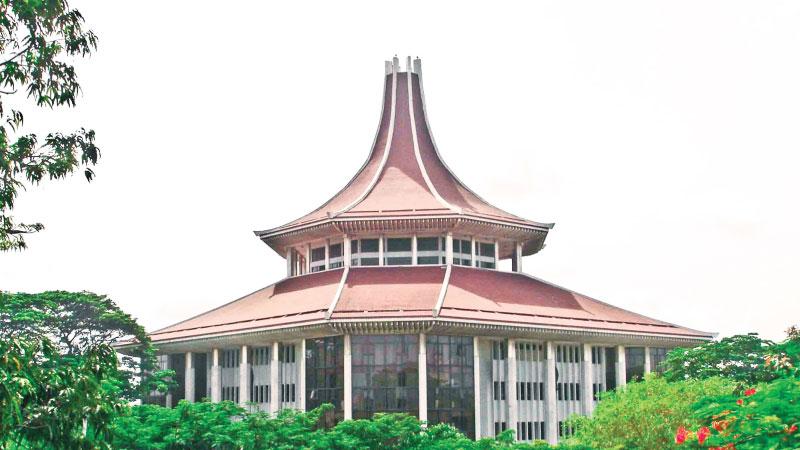
On April 9, Sri Lanka Freedom Party General Secretary MP Dayasiri Jayasekara revealed the possibility of seeking a Supreme Court (SC) decision on the term of Office of President Maithripala Sirisena. MP Jayasekara, an Attorney-at-Law said that President Sirisena’s term would end in May 2020 subject to the interpretation of the SC. This opinion has arisen despite the verdict given by the SC in January 2018, (at the President’s request), relating to his term of Office. It was restricted to five years as per the 19th Amendment to the Constitution. The Sunday Observer sought the views of several leading personalities on the matter.
 General Secretary of the SLFP - MP Dayasiri Jayasekara
General Secretary of the SLFP - MP Dayasiri Jayasekara
The Supreme Court had resolved the issue about the President’s term. Now the problem has arisen -when the five year-term of the President started and when will it end? According to the Article 80 (2) of the Constitution, a bill becomes an act once the Speaker signs it after a majority vote of Parliament. When it comes to the 19th Amendment, it was signed by the Speaker on June 21, 2015, if I’m not mistaken. ( Editors note-It was actually certified on May 15, 2015). Generally, provisions of an Act impact on future happenings. We can never enforce backdated Acts. We believe from June 21, 2015 to June 21, 2020, is the term of the President.
We have not yet decided whether we are going to Courts. My personal opinion is that we should seek the SC opinion on this. Only the SC has power to interpret it. I as a politician, a member of Parliament and an Attorney, know that Acts cannot be enforced progressively. We will decide on that once the Court begins after April 22.
 Advisor to the President - Shiral Lakthilaka
Advisor to the President - Shiral Lakthilaka
First of all, it is the Supreme Court who should decide on it (President’s term) and compatibility with the Constitution. The President should request first, for the SC to provide such interpretation. According to the article 1(3) of the Constitution, it clearly states two possible occasions when it becomes law. One group say that those Acts come into effect as soon as the Speaker signs them.
Another group who are against this, say that this was imposed in a retrospective manner where it came into effect on the day President Sirisena was appointed as the President- which we believe is wrong. Because there is no specific provision in the 19th amendment which states that it is retrospective.
 UNP National List MP - Dr. Jayampathi Wickremarathne
UNP National List MP - Dr. Jayampathi Wickremarathne
The term of Office of the President was reduced to five years from six years by Article 30 (2) of the 19th Amendment. To make it clear, the five-year term would apply to President Sirisena, as the transitional position was included in the Amendment.
The transitional position is in section 49 of the 19th Amendment. It says, “the persons holding office as the President and Prime Minister on the day preceding April 22, 2015 shall continue to hold such office after such date, subject to the provisions of the Constitution as amended by this Act.”
‘As amended by this Act’ is a key phrase which means the old office has been amended subject to the provisions of the 19th Amendment. There was no new President after the 19th Amendment. President Sirisena didn’t take oaths after the 19th Amendment - He continued in office under an amended Constitution. It is clear that the 19th Amendment is retrospective as far as the term of the President is concerned.
The President in January 2018, referred a question for the opinion of the SC. He did not ask the SC, whether his term is five years or six years. What he asked was, whether he can hold office for six years from January 9, 2015. Having analysed all the provisions of the Constitution, the SC determined that the Article 30 (2), which reduced the term of the President, is retrospective. I don’t know why the advisors to the President are urging him to again ask the same question from the SC.
Executive Director Centre for Policy Alternatives - Dr. Paikiasothy Saravanamuttu
Dr. Paikiasothy Saravanamuttu – Executive Director Centre for Policy Alternatives and one of the petitioners at the 2018 January case on the President’s term
I don’t really understand why he (the President) is doing it again. Unless it is some attempt to hold Presidential elections and General elections on the same day. And I don’t see any logic in this effort. Where the 19th Amendment is concerned, it has to be a five year term and the President has to go for a Presidential Election at the end of this year.
 General Secretary of the Lanka Sama Samaja Party (LSSP) - Prof. Tissa Vitharana
General Secretary of the Lanka Sama Samaja Party (LSSP) - Prof. Tissa Vitharana
Prof. Tissa Vitharana – General Secretary of the Lanka Sama Samaja Party (LSSP) and one of the petitioners in the January 2018 case on the President’s term
My opinion is that the Constitution and laws of the country should be fulfilled and that is a matter for the Courts to decide. If the question arises when the President’s term become effective, I’m sure that the Court would give a correct verdict.
To my knowledge, there was no discussion the last time (January 2018), about the effective date of the 19th Amendment. If the President wishes to receive a clarification on this, he can do so. We want everything to accord with the Constitution.
But the SC haven’t said anything about the date when the five year term came into effect. However, it is under the interpretation of the Supreme Court.
